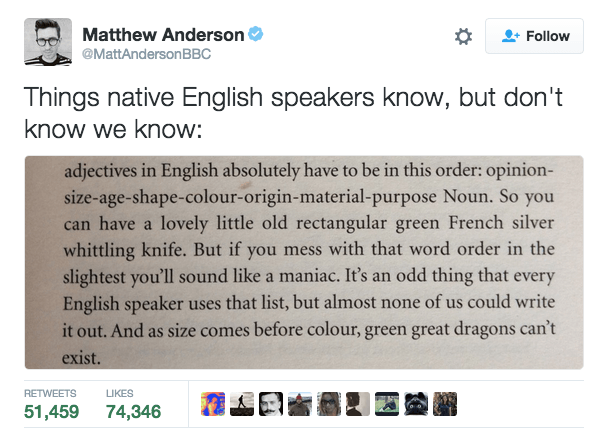Grammar is about the last topic I would expect to trend on Twitter. And yet, when Matthew Anderson, a BBC editor, tweeted a picture from Mark Forsyth’s book The Elements of Eloquence: How to Turn the Perfect English Phrase, it received tens of thousands of likes and retweets.
Things native English speakers know, but don’t know we know: pic.twitter.com/Ex0Ui9oBSL
— Matthew Anderson (@MattAndersonBBC) September 3, 2016
The popularity of this tweet fascinates me. Then again, I have an unhealthy love of the Oxford Comma and recently spent hours reading about the release of the MLA 8th Edition.
Still, why in the world would this trend? Are there that many grammarians around? Is adjective use that fascinating to people? Am I really cooler than I originally thought?
Well, the answer for the tweet’s popularity probably falls into our reaction to the implications of the tweet. As the BBC article “Why the green great dragon can’t exist” asserts, it comes down to a specific type of knowledge: “the unknown knowns, the things we know, but don’t realise that we do.” The “green great dragon” within the title comes from a famous comment from J.R. Tolkien:
My mother said nothing about the dragon, but pointed out that one could not say ‘a green great dragon’, but had to say ‘a great green dragon’. I wondered why, and still do. The fact that I remember this is possibly significant…
Like the discussion of adjectives from Matthew Anderson’s tweet, something deeper lies below. For Tolkien, everything has meaning—for goodness sake, even his swords and trees have names!—and that meaning matters.
According to the BBC article, the most frequent response to Anderson’s tweet was: “WHOAH!” When we find knowledge that we know but don’t realize we know, we are understandably shocked.
It also raises questions about what else we know but don’t realize we know. Or what else we have simply accepted without thought.
As much as this grammarian would love it if the popularity of Anderson’s tweet foreshadowed a new burst of enthusiasm for the English language, I doubt that’s the case. Rather, the tweet shows that the human person is more mysterious than we realized. Maybe there are more things we know, but don’t know that we know.


